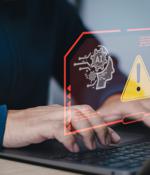Security News

Cybercriminals employ artificial intelligence to create complex email threats like phishing and business email compromise attacks, while modern email security systems use AI to counter these attacks, according to Perception Point and Osterman Research. Cybercriminals have shown rapid adoption of AI tools to their favor with 91.1% of organizations reporting that they have already encountered email attacks that have been enhanced by AI, and 84.3% expecting that AI will continue to be utilized to circumvent existing security systems.

Cybersecurity expert Kayne McGladrey speaks about why AI cannot do what creative people can, and the important role of generative AI in SOCs. Kayne McGladrey, IEEE Fellow and cybersecurity veteran with more than 25 years of experience, asserts that the human element - particularly people with diverse interests, backgrounds and talents - is irreplaceable in cybersecurity.

Typically, Automatic License Plate Recognition technology is used to search for plates linked to specific crimes. In this case it was used to examine the driving patterns of anyone passing one of Westchester County's 480 cameras over a two-year period.

The new AI cyber challenge will have a number of different phases. Interested would-be competitors can now submit their proposals to the Small Business Innovation Research program for evaluation and, eventually, selected teams will participate in a 2024 "Qualifying event." During that event, the top 20 teams will be invited to a semifinal competition at that year's DEF CON, another large cybersecurity conference, where the field will be further whittled down.

To counteract new and emerging threat methods enhanced by artificial intelligence, specialized email security vendors are leveraging a synergy of AI and human insights to enhance email security, according to IRONSCALES and Osterman Research. Over 74% of respondents have experienced an increase in the use of AI by cybercriminals in the past six months, and over 85% believe that AI will be used to circumvent their existing email security technologies.

Analysis Despite the hype around criminals using ChatGPT and various other large language models to ease the chore of writing malware, it seems this generative AI technology isn't terribly good at helping with that kind of work. In two reports published this week, Trend Micro and Google's Mandiant weigh in on the buzzy AI tech, and both reach the same conclusion: internet fiends are interested in using generative AI for nefarious purposes, though in reality, usage remains limited.

Code development, content creation and analytics are the top generative AI use cases. A little over half of businesses have experimented with AI. Surveyed companies using generative AI employed it in content generation, analytics insights summary, analytics insights generation, code development and process documentation.

Researchers are trying to use AI to detect "Social norms violations." Feels a little sketchy right now, but this is the sort of thing that AIs will get better at. Tags: academic papers, artificial intelligence, DARPA, Internet and society.

Generative AI has landed on Gartner's coveted Hype Cycle for Emerging Technologies for 2023, the firm announced Wednesday. The firm said generative AI will bring "Transformational benefit" in the next two to five years.

It's taking place September 18-20, 2023 in Washington, DC. mWISE conference organizers have just announced new keynote panels focused on two of the most pressing issues facing security practitioners right now: Artificial Intelligence and advanced adversaries. 1) AI and Security Standards: Maximizing Innovation While Minimizing RiskAI has immense potential, but we need to make sure it works for everyone.